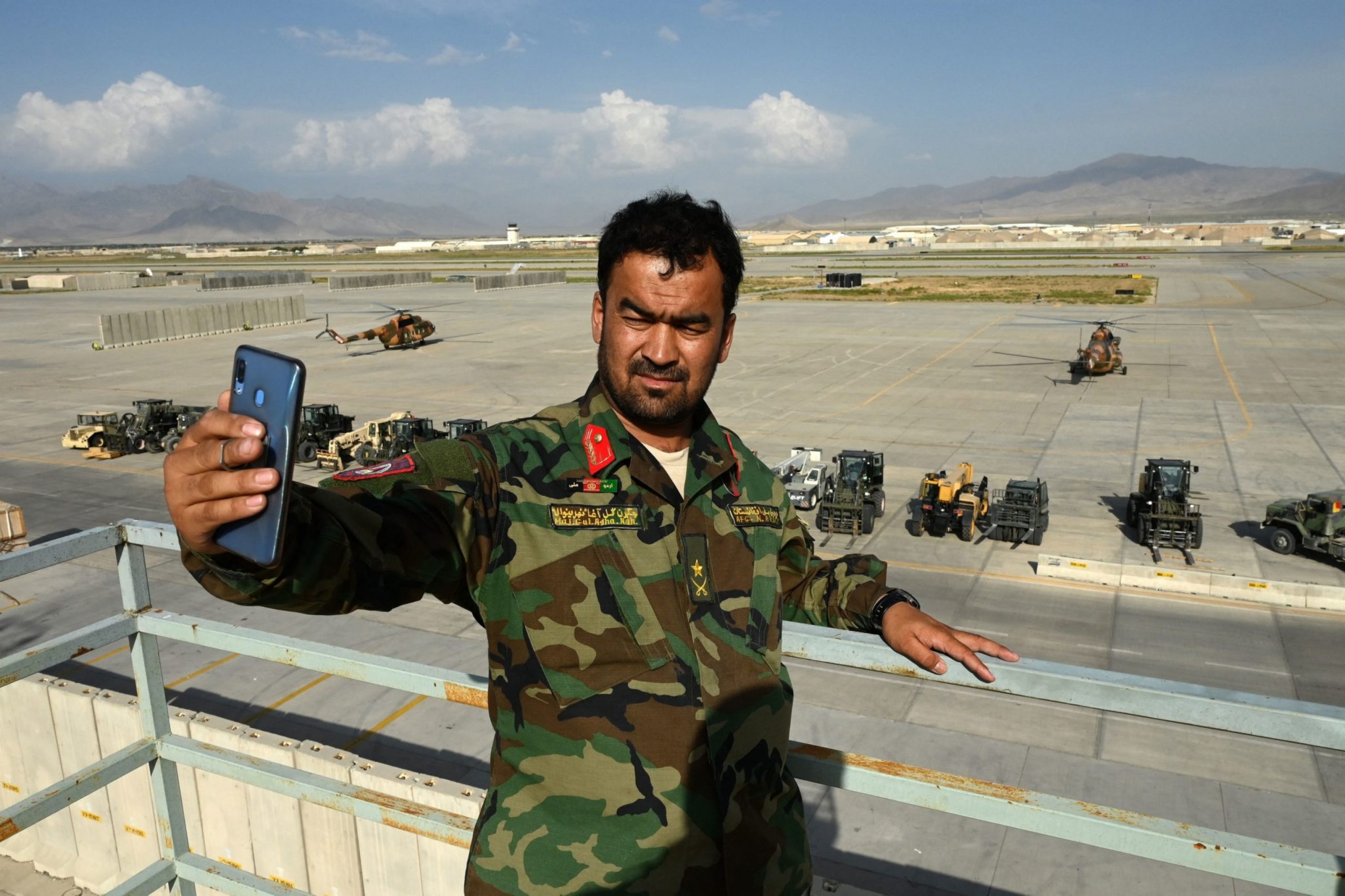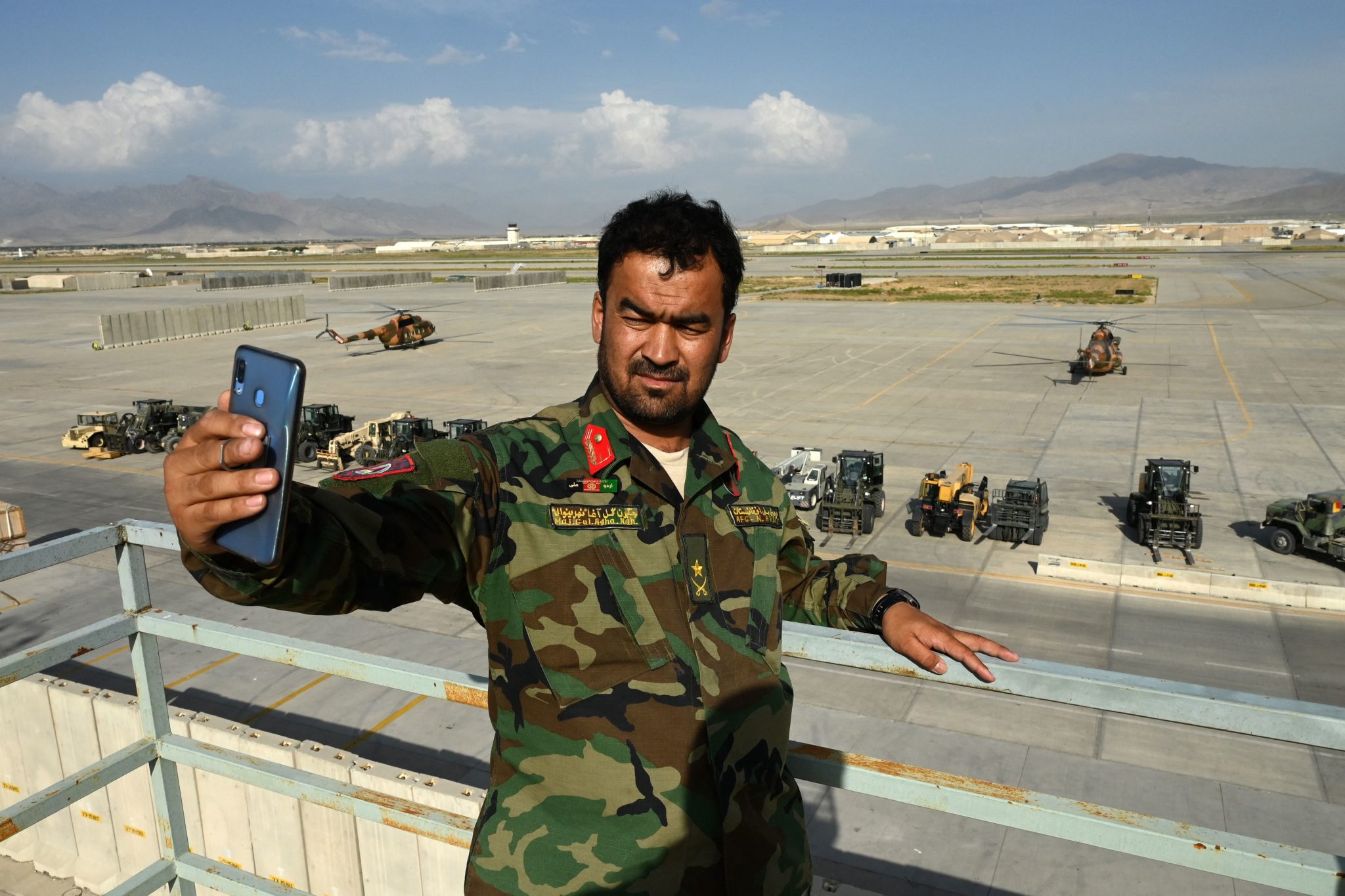Maybe We Won After All
Can we really say the Afghans learned nothing from us about what it means to be a modern nation?
An Afghan National Army (ANA) soldier takes a selfie with his mobile phone inside the Bagram US air base after all US and NATO troops left, some 70 kms north of Kabul on July 5, 2021. (Photo by WAKIL KOHSAR/AFP via Getty Images)
Some years ago I found myself having lunch with two friends at a certain restaurant in Washington. (Some of my readers will know exactly which one when I say that its interior looks like a set from John Huston’s film adaptation of The Man Who Would Be King.) The lunch was a memorable occasion, not least because it led to my becoming employed after a long-ish spell as a freelancer.
The friends with whom I was dining were both self-described neoconservatives. It is difficult now to conjure up the atmosphere of those days, when the memories of David Frum’s infamous article on “Unpatriotic Conservatives” were still fresh and the present overlap in contributors between publications such as this one and, say, City Journal or the Bulwark was almost unthinkable. At one point the subject of the wars in Afghanistan and Iraq came up, and I casually mentioned something both of my friends already knew—namely, that I had opposed both of these conflicts since my adolescence.
“I think we actually agree on the practical questions.” I remember saying words to this effect before laying out what seemed to me obvious: I wanted us to leave as soon as possible, but if we were going to remain over there—and no action taken by the Obama administration suggested anything to the contrary—we should do so without the ludicrous pretense of “nation-building.”
America was an empire, I said, and these were essentially colonial ventures. Iraq and, especially, Afghanistan did not need presidents and parliaments but governors-general or viceroys. It would be impossible for the foreseeable future to export many of our Western institutions, much less anything as nebulous as American “ideals,” not least because the sort of broadly shared public consensus that had made the British Empire feasible (whatever else might be said of it) simply did not exist and had not for some time. America was too internally divided about the most basic questions to impart a cohesive vision of liberal democratic capitalism to a pre-liberal, religiously inflected tribal culture.
This was more or less the substance of my argument. I like to think that at the time my interlocutors found it moderately persuasive, but actually I cannot say how my speech (I must have gone on for about 10 minutes in this vein) was received. It was seven years ago, and each of us had drunk at least that many stiff Bombays by the time the subject of Afghanistan and Iraq came up.
I found myself thinking of that delightful lunch earlier this week while watching the footage of our withdrawal from Kabul. I have already written about the ludicrous manner in which it has been handled. The question I think is worth asking now is not whether those of us who opposed the war have been vindicated (which seems to me beyond argument) but the nature of its failure. If we did not achieve our objectives, what, if anything, did we accomplish in Afghanistan?
Allow me another trip down memory lane. The world of September 11, 2001, is in some sense as remote as that of 50 years ago. On the eve of those attacks the American people still read newspapers and magazines. Dial-up internet was ubiquitous, but it was still a half-visible adjunct to our existence, something that helped to facilitate commerce and research rather than the meta-activity into which every facet of human life is subsumed. Google was a campus pet project; Apple was selling boxy colorful desktop computers beloved of a minority of hobbyists; Amazon was a curiosity for those of us who lived far from civilized bookstores. Cellular phones were for stereotypical day traders or travelers in hypothetical emergencies. Same-sex marriage was not only illegal—it was unthinkable, even in most Democratic activist circles. Race relations were almost certainly better than they are at present, and even mass shootings perpetrated by atomized video game enthusiasts were a comparatively new phenomenon. The long, slow decline of our industrial base was ongoing rather than complete. Despite the bursting of the Dotcom Bubble, it was still very much the End of History, a world of gleaming malls and optimism.
The speed at which this comparatively stable world was destroyed could be the subject of a very long book. In the space of a short opinion column, I must confine myself to observing that during the presidencies of George W. Bush and Barack Obama, digital technology not only destroyed publishing as we knew it but emerged as an augmented reality outside of which it is impossible to imagine even the most basic human activities taking place. The financialization of the economy continued apace with not only the rise of novel investment vehicles but the displacement first of trade unions and then even of the ordinary employer-employee relationship among the working classes by the so-called “gig economy.” The most basic assumptions about the nature of the human person were questioned and discarded while American society, commerce, and our political institutions themselves were revolutionized at a far more rapid pace than they had been even half a century ago during the ferment of the 1960s. All that was solid was melting into air. Amid such revolutions, how was it possible to speak of our imparting “values,” much less a concrete set of institutional norms, to a country on the other side of the world? The whole venture was surely doomed to failure.
But I wonder about that now. Is it possible that the neoconservatives were right, albeit in ways that they would not have guessed, about our capacity to project those very strengths upon which American democracy rests? The reports of President Ghani stuffing $169 million into a helicopter before fleeing with his family to the United Arab Emirates suggest that he has learned a thing or two from our leaders about the imperatives of electoral politics. The logistical and other failures of the Afghan army were concealed even from ordinary citizens by the use of metrics which seem to have been designed not to gauge the actual state of things on the ground but for their own sake, to justify the remuneration of those charged with designing them. Meanwhile those in charge of economic affairs seemed to be under the impression that Afghanistan did not require an industrial base, that prosperity would flow effortlessly from M.A. programs in gender studies at Kabul University. The opium trade that continues to be responsible for some $3 billion in exports each year was allowed to continue more or less uninterrupted, and liberal nostrums about human nature that were de rigueur in official communications were not received by the vast majority of the population, especially outside major cities. (One of our gravest errors in the last two decades has been talking about Afghanistan in terms of “radical Islam,” when many of the things we find objectionable about Afghan society have as much to do with tribal customs that predate not only the Taliban but the reactionary Sunni ideology that gave birth to it along with Al Qaeda, ISIS, and other groups more than half a century ago.)
A venal and incompetent political class for whom credentialism is both the premise and the conclusion of every argument, the replacement of expertise with self-exculpatory definitions of progress decided upon by those who are meant to be at their mercy, a fake knowledge economy that floats above the sordid reality of wage slavery and other forms of exploitation, indifferentism in the face of an narcotics cult, a patently false and increasingly absurd account of human nature that is roundly ignored by those who do not belong to the professional classes (some of whom no doubt hold other and perhaps even crueler superstitions)—one has to ask how different this is from the United States and whether, perhaps, the Afghans managed after all to learn something about our esteemed “values.”
Maybe we really did win the war.
Matthew Walther is editor of The Lamp magazine and a contributing editor at The American Conservative.


